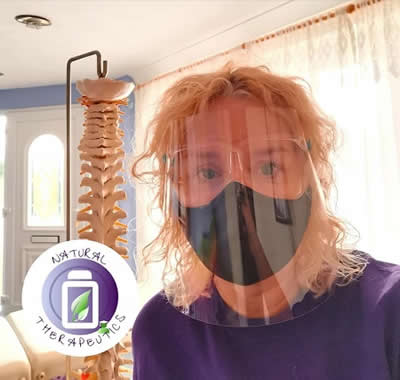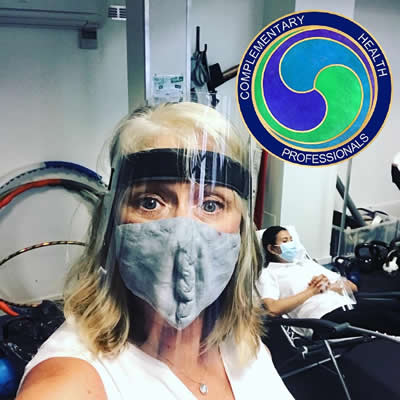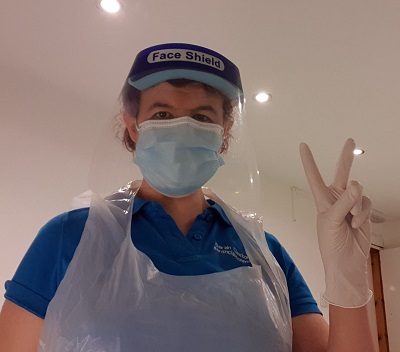Positive Health Online
Your Country

How COVID-19 has Impacted Complementary Therapists
listed in clinical practice, originally published in issue 268 - February 2021
As a Director of one of the leading Professional Associations in the UK (Complementary Health Professionals), this year has been a challenge; what with working hard to keep our members up to date with information and to give both our members and our accredited training schools the guidance they have needed in order to practise and teach. What has been even more frustrating has been the pace at which information was often forthcoming from government agencies and even worse, that each country in the UK decided to do lockdown or use tiered systems differently at different times!

Carole Preen CHP Director, Owner Natural Therapeutics Training
As a result, I have spent many, many hours on the phone or on group chats with therapists and trainers this year; we have shared frustrations and information as well as the general consensus that complementary therapist’s services are needed now more than ever due to the impact this pandemic has had on mental health. It has been refreshing to see that we, as a profession, have finally been recognized as healthcare workers and have been able to work in some instances through the second lockdown in England at least, but we do still have a long way to go and we as an association, will continue to strive for recognition. One of the issues within our profession is the lack of standardization in training, despite the massive amount of work that has been done already. It would seem that qualifications at level 5 and above are the way forward and we will be looking at how we can upgrade existing skills in the main therapies to help therapists attain this higher level of knowledge and skills at level 5. Two of our accredited massage therapy and sports massage schools already offer level 5 and level 6 qualifications in these two modalities; these are Jing Advanced Massage Training in Brighton and the North London School of Sports Massage in London (with a satellite school in Manchester). You can find their details on our website (see below).
What has become very apparent from speaking with therapists has been the changes they have felt this year. Sarah Yow MCHP, a therapist and trainer from the CHP accredited school - Routes to Healing in Cambridge (see our website), had a very interesting observation regarding new clients. She explained that new clients arrive in a mask and wear it throughout their treatment. During that time the client will discuss their physical and personal problems and yet the therapist would not be able to recognize them if they saw them in a line up! What is more, you would not be able to recognize their voice either as it is muffled by the face covering. Therapists are also covered in PPE and that intimate relationship we normally have with clients discussing their issues is being stifled and reduced. This makes therapists feel very discombobulated; it is not a situation they enjoy.
Another CHP member, Sue Roebuck MCHP, sent me some interesting thoughts about her experiences. She works as a massage therapist and essential oil practitioner at a cancer hospital in Weston Park, Sheffield which is one of three specialist cancer hospitals in the country. Initially, lockdown was a source of frustration for them as up until this point massage therapist were classed as ‘frontline’ workers. As soon as the spread of COVID-19 became a threat to the NHS and wider community prior to the national lockdown, complementary therapy was removed from the specialised cancer services within the NHS Foundation Trust. Sue was actually about to develop the service further by taking on new therapists and moving into the outpatient department of the hospital, providing a much-needed massage therapy service for metastatic breast cancer patients. Dates had already been set in April 2020 for this these developments to take place. Once lockdown (Part 1) had ended, Sue asked to go back to work as soon as it was legally allowed by the government. The nurse director for specialized cancer looked on the NHSE for complementary therapy return to work and not surprisingly, complementary therapy was not represented there. Therefore, Sue had to submit the gov.uk report and explain how complementary therapy was represented in this sector with supporting emails from CNHC - Complementary and Natural Healthcare Council, CHP - Community Health Partnerships and GCMT - The General Council for Massage Therapies. After waiting well over two months she probably will not be back working until a vaccine is found due to infection control and prevention. As with many therapists, most of whom are self-employed, Sue has had to claim the SIESS - The Self-Employment Income Support Scheme - grant from the government but this has in no way fully compensated them for their lack of earnings; many newly self-employed therapists who have paid thousands of pounds for their training, have not been able to even claim that. Many therapists with small practices have also been adversely affected this year and have had to put their practices on hold.
Another therapist, who did not want to be named, spoke about the fact that he does a lot of energy work and how difficult it has been to create that special relaxing atmosphere needed to allow the client to drift off into what is often an altered state of deep relaxation. Tuning into energies has, he said, been more difficult, not because of his abilities but because he was so aware of the mask and visor. Having his voice muffled behind a mask and visor often made it difficult for him to speak in the soft, comforting tones he usually employs without the client constantly having to ask for it to be repeated because they could not hear what was being said. Needless to say, a return to “normality" will be most welcomed.

Julie Quinn CHP Director, Owner Julie Quinn Complementary Therapies
I have seen comments on some of the online forums too with remarks on the amount of PPE – Personal Protective Equipment - complementary therapists are using. We are a member of the General Council for Soft Tissue Therapies (GCMT), a national body where professional associations such as ourselves come together to further promote and represent the interests of massage therapy and related soft tissue bodywork. A huge amount of work was done this year to help therapists belonging to members associations with COVID-19 guidance and we did suggest they wore everything right from the start. The government was not so quick with this guidance but soon caught up so that therapists were required to wear a visor and mask. We also recommended the wearing of aprons (or to change tunics between clients) and gloves. As a result, I heard it said that complementary therapists were probably wearing more PPE than some hospital staff who were not working on COVID patients! However, we wanted therapists and their clients to feel safe and confident to continue their vital work. That said, more than one made the suggestion to me that they were so protected surrounded in PPE, they felt like a walking condom! Humour has been very important through this challenging time. Therapists have referred to themselves as being akin to Darth Vader in their PPE and allowed their clients one silly comment and one only! We had a gallery on the CHP forum where we invited therapists to post pictures of themselves in PPE so that they could share the experience as we often work in isolation, so this really helped. One of our schools referred to themselves as “PPE warriors” trying to put a positive spin on the situation and to make light of the fact that although no-one likes having to wear it all, we do it because it is the right and responsible thing to do.
Therapists work in different ways and although most are self-employed, they can work in their own clinic or as part of a complementary therapy centre, from a dedicated space in their home or as a mobile therapist visiting clients. Some therapists may combine all three, working sometimes from a clinic and spend some part of their week visiting clients. This has meant a great deal of additional work this year making sure they are working in a COVID-19 secure way; I have been amazed and immensely proud on how our members have stepped up to the plate in this regard. Despite all the frustrations, their main aim was to adapt so that they could continue to support their clients, who they all really care about. This profession really is a calling, with an underlying passion to help people who often have serious and complicated health problems. We, as complementary therapists, do an enormous service to reduce the strain on the NHS and this fact should no longer be ignored.

Sarah Claxton MCHP Massage Therapist SE1
Training in complementary therapies has also been very difficult this year with many schools not able to offer training at all and others finding their way through with support from us. It is great that so many people have wanted to train to become a complementary therapist despite the pandemic. Theory went more online and where face-to-face training is necessary, for bodywork and mind therapy supervision, protocols were set up to allow training to continue where possible. External exams have also been interesting; these also went online where we watched therapists one-to-one via zoom or video and did their feedback and interviews all on the internet. It is amazing how resourceful one can be! I am lucky in that I already had some online training diplomas running in essential oils and anatomy. My bodywork training has been put on hold this year and my students have been very understanding. I do also have a good number of massage and aromatherapy CPD - Continuing Professional Development - and introductory courses; I have been so pleased with the take up from therapists who have used their time during lockdown to increase their skills and knowledge this way. If you would like to know more about the courses I offer, head over to my website at www.naturaltherapeutics.co.uk
One thing that is very certain is how much therapists and training providers have needed the support of their professional association this year. We have received so many letters thanking us for our hard work trawling through the nightmarish information and simplifying it down into easy to understand, accurate guidance. We produced helpful resources for therapists to use for pre-screening and recording their cleaning regime in between clients as well as general guidance for all possible scenarios. We have been on hand on our helpline to clarify facts and information and to dispel misinformation and myths that were being banded about on social media. If you would like to join a dynamic and pro-active association that interacts with its members you can join us online via our website at www.complementaryhealthprofessionals.co.uk
Comments:
-
No Article Comments available